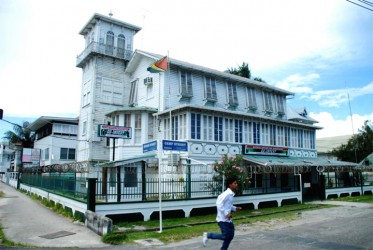The Guyana Manufacturing and Services Association (GMSA) has used the occasion of its 50th anniversary to identify the need to overhaul the current operations of the Guyana Office for Investment (Go-Invest) as an important prerequisite to enhancing the interests of the country’s manufacturing sector.
In a relatively short but insightful examination of the challenges that continue to impede the growth of the country’s manufacturing sector, the GMSA is calling for “a comprehensive, extensive review and possibly revamping of existing mechanisms both in processes and structure” of Go-Invest, “if we are to succeed in modernising our approach to accommodate the establishment of the new manufacturing businesses in Guyana.

While the GMSA paper – published in its 50th anniversary brochure – neglects to identify the specific structural or operational areas within Go-Invest that require revamping, the agency, touted by government as a ‘one stop shop’ for investors has come under fire from potential investors who have criticised what they say is its sloth and excessive bureaucracy. This week, a well-placed private sector official described Go-Invest as “virtually leaderless, lacking any real sense of direction and being run by remote control”. However, some small business operators in the handicraft industry have credited the organisation with facilitating their participation in regional and extra-regional trade shows.
And while the manufacturing sector continues to worry over the impact of unreliable energy supply and the additional production costs associated with providing off-grid energy, the GMSA says that the inefficiencies in the sector are also attributable to considerations that go beyond the country’s power supply problems.
Interestingly, in its presentation, the association cites a number of impediments which, it implies, could be remedied through government intervention including “very high trade transaction costs coupled with inordinate customs delays in both import and export transactions. The GMSA says that these weaknesses can be eliminated or substantially reduced “with the implementation of the long delayed Single Window Automated Processing System (SWAPS) which it says is currently being implemented but needs to be accelerated.”
And the GMSA has also cited what it says is the “absence of specific funding institutions geared to promote manufacturing, such as a development bank and the non-existence until recently of a bona fide credit bureau to establish the creditworthiness of local entrepreneurs.” These, the GMSA says “could significantly contribute to growth within the sector.”
And in the face of what the GMSA says is “a relatively limited local market” it chides government for failing to take optimal advantage of “those opportunities contained in bilateral and multilateral trade agreements.” Several such agreements have been signed with neighbouring countries including Brazil and Venezuela.
In its wide-ranging review of the manufacturing sector the GMSA is also calling for the encouragement of investments “particularly by the private sector” in sectors that include maritime and air infrastructure, logistics, and warehousing “to facilitate the movement of people and goods” across the country; reduced dependence on inappropriate and in some instances near-obsolete technology; increasing the range and quantity of fiscal incentives for locally manufactured goods; enforcing measures “to curtail unfair competition faced by certain local manufacturers” on account of “smuggling and by cheaper foreign inputs aided by the non-imposition of quality standard requirements; the mandatory application of incentives and/or disincentives by the regulatory agencies to ensure adherence to quality assurance and reliability standards”.
Among the various other structural and operational changes within the manufacturing sector which the GMSA is seeking is the accelerated utilization of ICT through specialized training and development and the intensification of the provision of financial assistance to medium and small enterprises “to enable them to be listed on the Stocks and Securities Exchange.”





